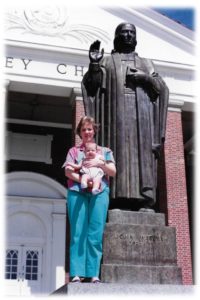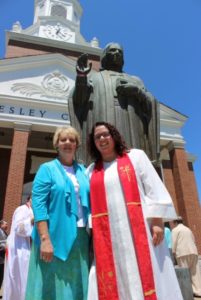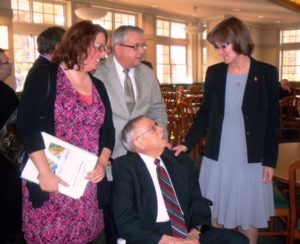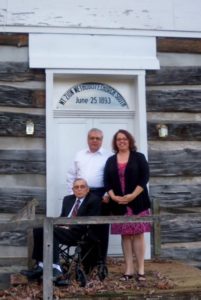By Rev. Gregory A. Godwin and Rev. Lauren A. Godwin

What time is it? Dr. Heather Elkins asks her students this question and many look at their watches to discern the time (chronos). With a smile, she also reminds them as messengers of God’s hope they need to discern God’s time (kairos). Something that won’t show up on their watches. One of the things that I have learned from Dr. Elkins asking, “What time is it?” is the powerful ways God’s hope is revealed in the world when chronos and kairos
meet.
Chronos is one way of looking at time. We often mark our lives by chronos time and can extend chronos time over generations. For example, the 2017 Annual Conference marked the 65th anniversary of the ordination of my grandfather, Charles Godwin, as an Elder, the 30th anniversary for my father, Greg Godwin, and my 3rd anniversary. Our family life for three generations has been linked to the rhythm of the WV Annual Conference. It all began when my grandfather received his first appointment while a student at West Virginia Wesleyan in 1946. My dad and I were probably not even figments of his imagination at that point. I imagine that he had no idea in 1946 what would unfold in our family life. Three generations making their way to WVWC every June for Annual Conference.
Greg: It is amazing how much can change in a relatively small amount of chronos time. My earliest memory of Annual Conference is attending Children’s Conference, while my dad is eating a picnic lunch on the lawn of Wesleyan when Conference was held in the Atkinson Auditorium. I remember going to Annual Conference not knowing whether we were moving or being rea ppointed to the same place. My dad grew up in a time when appointments were occasionally made at Annual Conference and sometimes you only had a few days to pack up and be ready to move.
ppointed to the same place. My dad grew up in a time when appointments were occasionally made at Annual Conference and sometimes you only had a few days to pack up and be ready to move.
Lauren: There wasn’t children’s conference when he was small, so if he wasn’t enjoying the picnic and listening into the sessions of Annual Conference from the lawn, then he would spend time with his grandparents learning the art of gardening, getting a glimpse of God’s original blessing in creation. I spent every Annual Conference that I can remember with my grandparents, especially since they retired to Buckhannon. I have vivid memories of being picked up from children’s conference and converging on my grandparent’s home where we would all gather around the table for lunch or dinner and have a review of some of the conference business. Something I didn’t fully understand as a small child, but have come to appreciate in my adult life. For us, going to Annual Conference isn’t just about spending time with fellow United Methodists, but it is precious time spent with family.
This year was the same as all the other Annual Conferences in my life, we gathered together at WVWC for worship, to conduct business of our conference, and look at what went well since we last gathered and what we need to change moving forward. This year, our conference was focused on the theme of HOPE. Our Bishop encouraged us to engage in holy conversation, to feast on the scriptures, and to pray in discerning God’s hope entering into our world.
One place we were reminded of God’s hope entering the world in a chronos/kairos moment during conference was the celebration of our historic African American Congregations. We were reminded of the gift of a rich history they bring to the life of our conference. It also reminds us of a painful piece of our history. Racial Central Jurisdictions were created in the 1939 merger that resulted in the Methodist Church. That history reminds us, GOD’ S time has not been without pain or convenient.
As a young pastor and district superintendent of the Parkersburg district, my grandfather advocated for the elimination of the Racial Central Jurisdiction and supported it in the Annual Conference and as a General Conference Delegate in 1964. Little did my grandfather know, his work towards inclusion of all God’s children in the life of the church would have such a huge impact on his family. However, in 1965, when the merger took place, Dr. Ramsey Bridges was rejected by a district in our conference because he was African American. Through the support of Bishop Holloway, my grandfather worked with the leadership of the Parkersburg District to receive Dr. Ramsey Bridges. This resulted in my grandfather leaving the district early and being sent to First Church Buckhannon for a cut in salary. It also brought some unhappy folks, who would show up to the district parsonage before the move to share their disdain for having an African American district superintendent. My dad remembers a certain tone of voice being used at the door of the parsonage, not fully understanding at the time what was taking place, but later knowing that my grandparents diligently worked for full inclusion of the church. Clearly moving away from a segregated and towards a more inclusive church has not been without pain or convenient.
I share this history to illustrate how it changed the chronology of my family’s history. Although he took a cut in pay and moved into a parsonage attached to the church, my grandfather had an effective ministry in Buckhannon. At this Annual Conference, Bishop Steiner Ball invited us to exit our churches and reach out into the community. His ministry in Buckhannon is one that reached out into the community, particularly his leadership uniting factions in the community to build a new Buckhannon-Upshur High School. Not knowing at the time, 13 of his grandchildren would attend and graduate from the school he helped build. Not realizing in 1965, that Buckhannon would become home for our family. Buckhannon is our home because my grandfather trusted in the convergence of God’s time into the life of the church, pushing it towards a more HOPEful, loving, and just community of faith.
Buckhannon becoming home isn’t the only way we can see the convergence of God’s time into the life of the church. Thirty-six years after the merger that “ended” segregation in the church, my dad was appointed to a charge with a historic African American congregation. For me it serves as a reminder of the ways in which we still deal with racism in the life of the church. Whether it was intentional or not, my high school brain picked up on the message of an all-white church not being open to their African American brothers and sisters. They financially subsidized the African American congregation and shared a pastor, but that was it. They didn’t go out of their way to worship or do the work of ministry with their brothers and sisters in Christ. An experience that has stayed with me and one I shared with my circle of grace at Annual Conference as we discussed what we can do in our congregations and communities to work towards full inclusion in Christ’s body.
Another story that emerged from our circles of grace conversation and in our reflections of annual conference of how God’s timing breaking into our chronos time to reveal God’s hope, was the appointment of our first African American Bishop in WV, Bishop Ernest Lyght. I will never forget the Sunday I returned home from college as Concord Church celebrated its 150th anniversary. The church had a very nice dinner at Concord University following the service and my family was sitting with Bishop Lyght and Eleanor. Randomly, Bishop Lyght asked me what my plans were after college. I shared my intention to attend seminary which gave reason for him to ask me which seminaries I was considering. I rattled off the list and then was confronted with a response from Bishop Lyght that my dad recalls being shared in a firm Bishop’s voice that left him wondering what I had said to make the Bishop use such a tone. He wanted to know why Drew wasn’t on my list. I didn’t really have an answer. As I fumbled for words and excuses, Bishop Lyght speaking in the same tone as before, told me he would write a letter of recommendation for me, but only for Drew. I wasn’t sure how to take it. After visiting Drew, I took Bishop Lyght up on his offer and applied to Drew. Little did I know, that was God’s hope breaking into my chronos time. That conversation changed the trajectory of my seminary decision.
Struggling with which school to choose, I called my grandfather for his wisdom. He wouldn’t tell me what school he thought was better and left it up to me to discern. I later called my grandfather and told him of my decision to attend Drew. I will never forget the reaction from some clergy, I was breaking “tradition” by not going to the seminary of my dad and grandfather. In talking with my grandfather, he clearly stated that in his opinion, I made the decision he would have made. There wasn’t a choice, in his mind, between the schools I was considering. He affirmed my decision with the affirmation that “it was time to write a new chapter.”
Lauren: I am so thankful that Bishop Lyght knew me better than I knew myself, and knew that God was calling me to Drew. It was at Drew that many wonderful things happened in preparing for ministry. One of the gifts was sitting in the classroom of Dr. Heather Elkins. I was one of the students who looked at the watch when she asked, “What time is it?” Although I had many wonderfully brilliant professors, no one except Heather hailed from West by God Virginia! She knew my home among the hills and had been shaped deeply by it – never forgetting her roots! It was a privilege getting to know her and learn from her. I was not the first in my family to be guided by her wisdom. In 1978, my dad received a letter from his father while serving at the Karachi American Consulate, expressing that Heather was a great preacher and was to be appointed as the associate pastor at First Buckhannon. She mailed him her sermons while he was in the service and when he returned home from the service she helped him discerned his call into ministry. She encouraged him to run for the Upshur County School Board and to his surprise, was elected. I wonder if she ever imagined that she would be nurturing his daughter in a seminary classroom some 30 years later? Although women’s ordination in The United Methodist Church has been occurring since 1956, there were still some who didn’t believe women should be included in the life of the church as clergy. Like times before, my grandfather believed that the church needed to be inclusive. In addition to the importance of inclusion, he knew Heather’s talents and gifts would  take her far in ministry. I wonder if my grandfather could have fathomed that his letter about a gifted preacher/teacher would be someone who would care for and nurture two more generations of his family?
take her far in ministry. I wonder if my grandfather could have fathomed that his letter about a gifted preacher/teacher would be someone who would care for and nurture two more generations of his family?
My grandfather lived just long enough to see me graduate from Drew and return to my home among the hills. He was present for my commissioning and witnessed our first female Bishop in WV, something he never dreamed of seeing. In fact, the rhythm of church life brought a special gathering of the Annual Conference in October 2012 to welcome Bishop Steiner Ball to WV. That gathering was my grandfather’s last. Towards the end of his life, he didn’t have very many good days. That day of our special session was an exceptionally good day for him. He was very alert and was able to participate fully in welcoming Bishop Steiner Ball. He told us that our new Bishop “was a keeper.”
 He was having such a good day, that he wanted to show me the Mt. Zion Methodist Church near Shavers Fork in Randolph County. Before WWII, he would conduct services under the supervision of the pastor at First Elkins. While there, he shared some of his memories of starting out in ministry. Like how he rode his bike down the very windy, steep country road to get to the church. Being young, he wasn’t taken seriously and people would speak over him in church. He can remember hitting the pulpit one day and people being stunned into quietness. It’s a day we remember fondly and celebrate that we saw the rhythm of my grandfather’s life in the church coming full circle in many ways.
He was having such a good day, that he wanted to show me the Mt. Zion Methodist Church near Shavers Fork in Randolph County. Before WWII, he would conduct services under the supervision of the pastor at First Elkins. While there, he shared some of his memories of starting out in ministry. Like how he rode his bike down the very windy, steep country road to get to the church. Being young, he wasn’t taken seriously and people would speak over him in church. He can remember hitting the pulpit one day and people being stunned into quietness. It’s a day we remember fondly and celebrate that we saw the rhythm of my grandfather’s life in the church coming full circle in many ways.
The rhythm of our family life continues to be tied to the life of the church, especially the West Virginia Annual Conference. My dad and I can remember hearing and experiencing, as children and adults, the church’s struggle with unity, embracing hope, and desiring inclusion. Although our conversations last week were centered on these things, it is not the first time the church has struggled with being faithful. As we reflect on Annual Conference, we recognize the many ways God’s timing has broken into our earthly, family oriented time offering hope. Perhaps the best way to describe our time together last week is with the question Dr. Elkins has asked her students countless times. Church, what time is it?
Rev. Gregory A. Godwin is Senior Pastor at First UMC, Clarksburg, WV.
Rev. Lauren A. Godwin is Senior Pastor at Grace UMC, Keyser, WV.